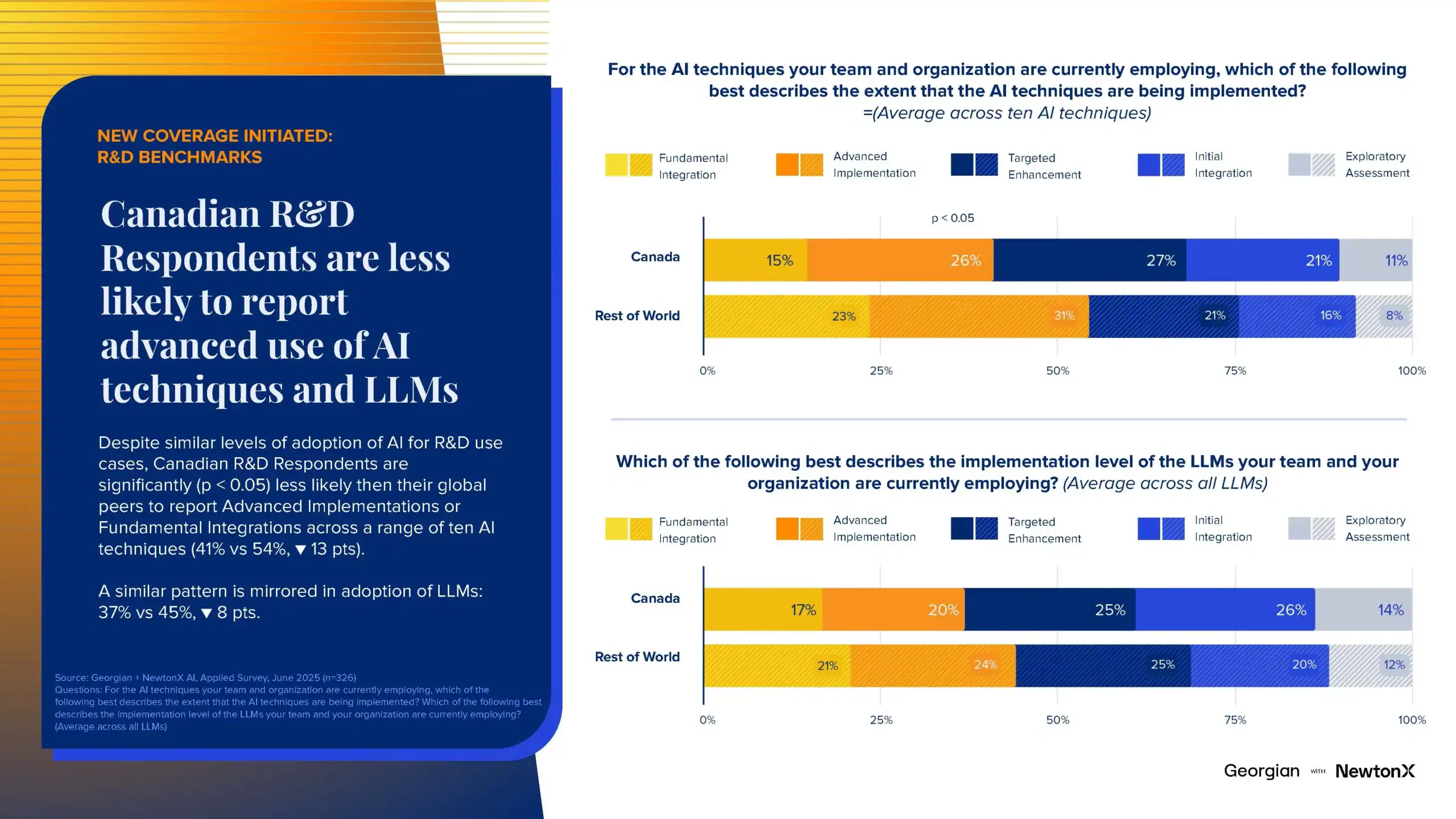
Addressing Gaps in Canadian AI Maturity and Implementation
It has been a busy month in Canadian tech; from Toronto’s Tech Week to the publication of four Artificial Intelligence (AI) reports including:
- Georgian and NewtonX report on Global AI adoption
- StatisticsCanada report on AI use by Canadian Businesses
- KPMG report on Global AI adoption
- RBC report on AI adoption in Canadian companies
- Toronto Tech Week
My goal is to synthesize findings from some of these reports and events into what I hypothesize are 3 key gaps in AI maturity and implementation in Canada:
- The AI Maturity and ROI Gap
- The AI Skills/Talent Gap
- The AI Adoption Gap
I rely on the research we have undertaken at Georgian in collaboration with NewtonX to support my categorization of Canadian AI maturity gaps and provide potential solutions for Canadian entrepreneurs and businesses hoping to address these challenges.
Gap 1: The AI Maturity and ROI Gap
The Problem
The problem is captured by Nobel prize winner and “Godfather of AI” Geoffrey Hinton who says: “It will be very hard for Canada to stay at the forefront of AI”(BetaKit). According to Hinton, “most Canadian industry is very conservative […] They’ve been bad at taking up AI and educating employees. That’s a big problem.” (FinancialPost).
Further, on a recent panel hosted by the Vector Institute and the University of Toronto’s Frontiers of AI, the Executive Director of Vector Institute’s Applied AI Programs, Craig Stewart, noted that while Canadian technical talent is advanced, Canadian companies are still not leveraging that talent to commercialize their products.
Insights from Georgian and NewtonX Research
- We segmented survey respondents using Georgian’s proprietary Crawl, Walk, Run AI maturity framework and noted that 69% of Canadian respondents are still in low or low intermediate stages of AI maturity compared to 41% of respondents across the rest of the world.
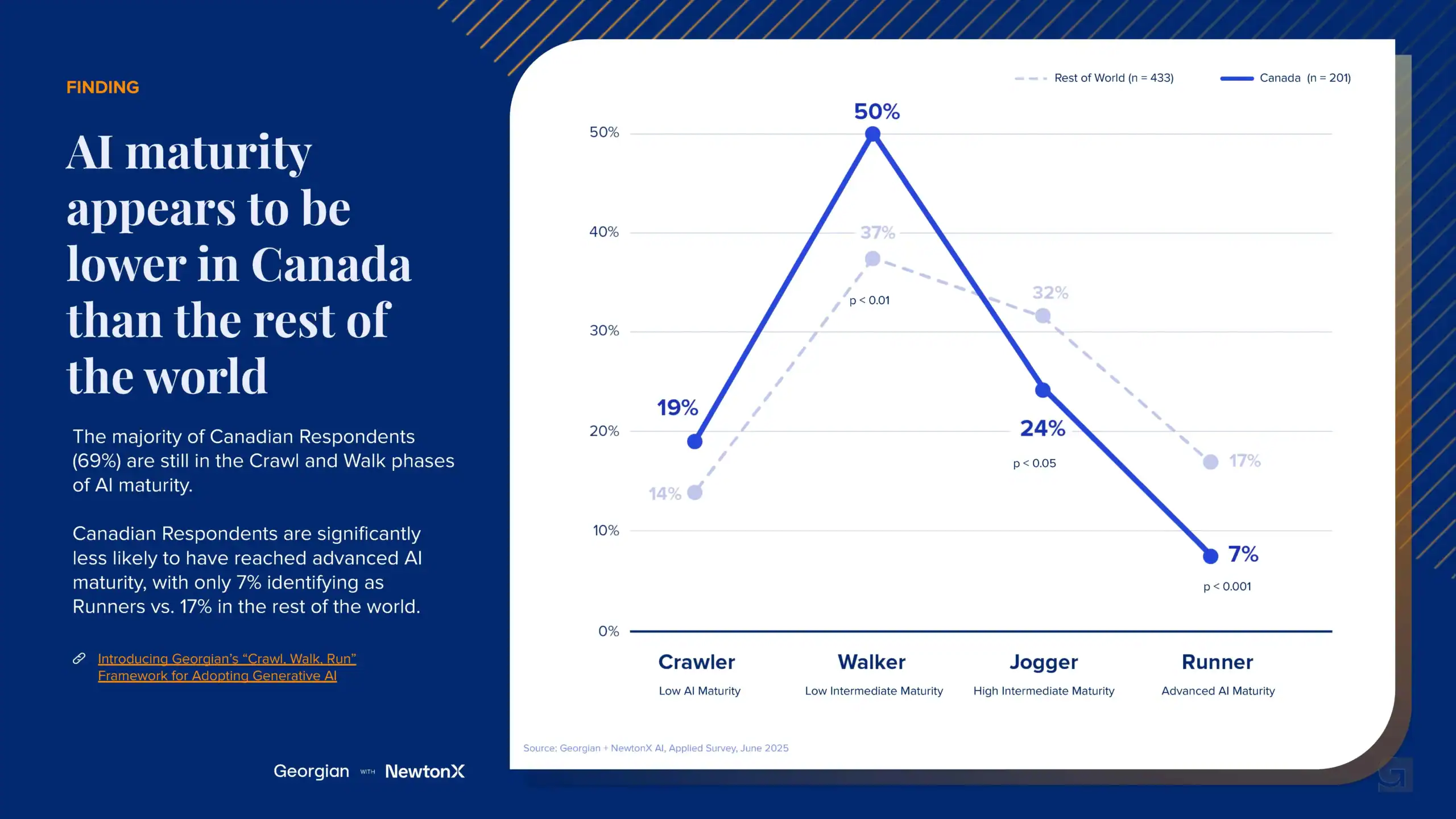
- Runners are more likely to tie their AI initiatives to revenue or cost savings opportunities.
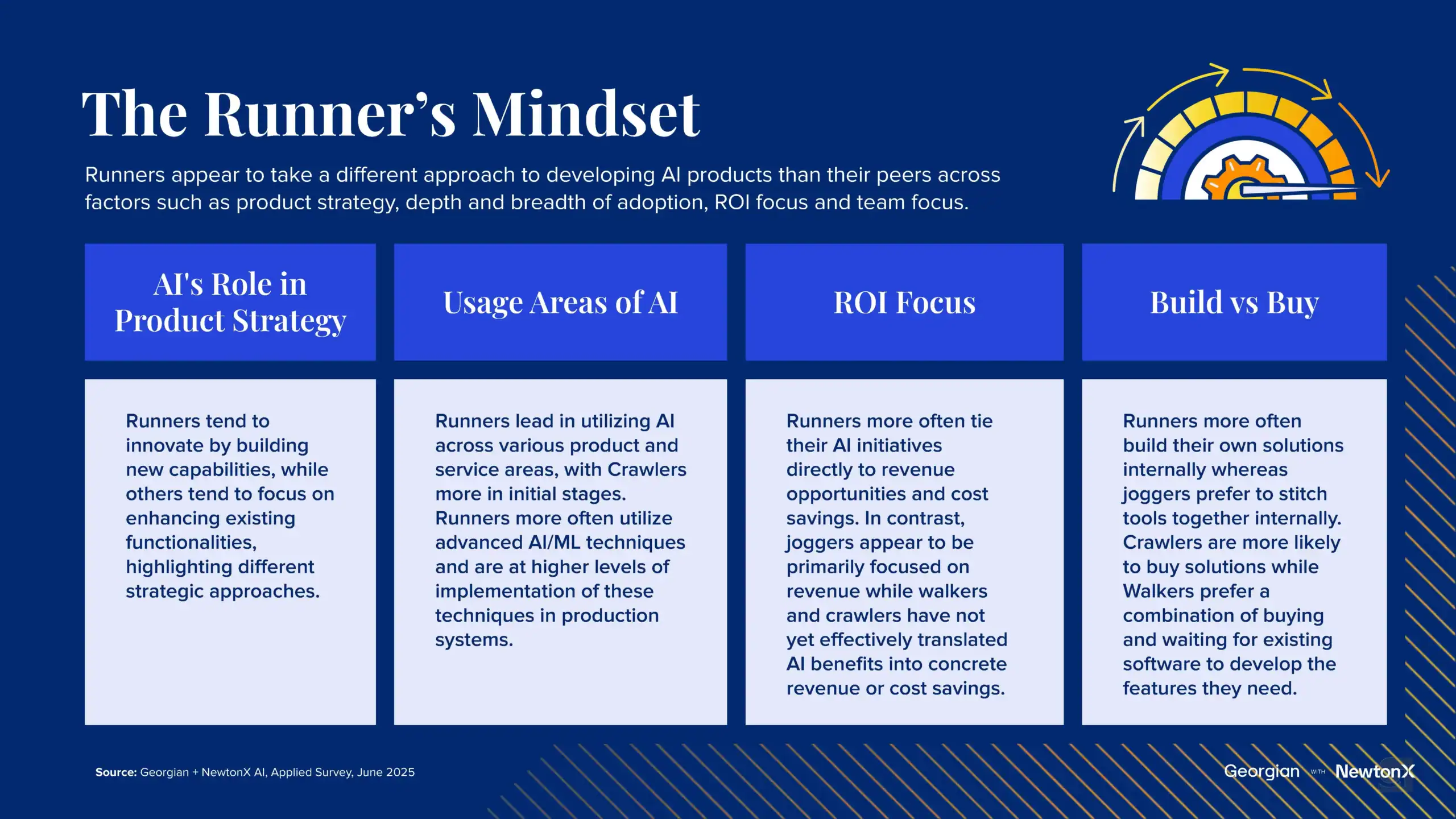
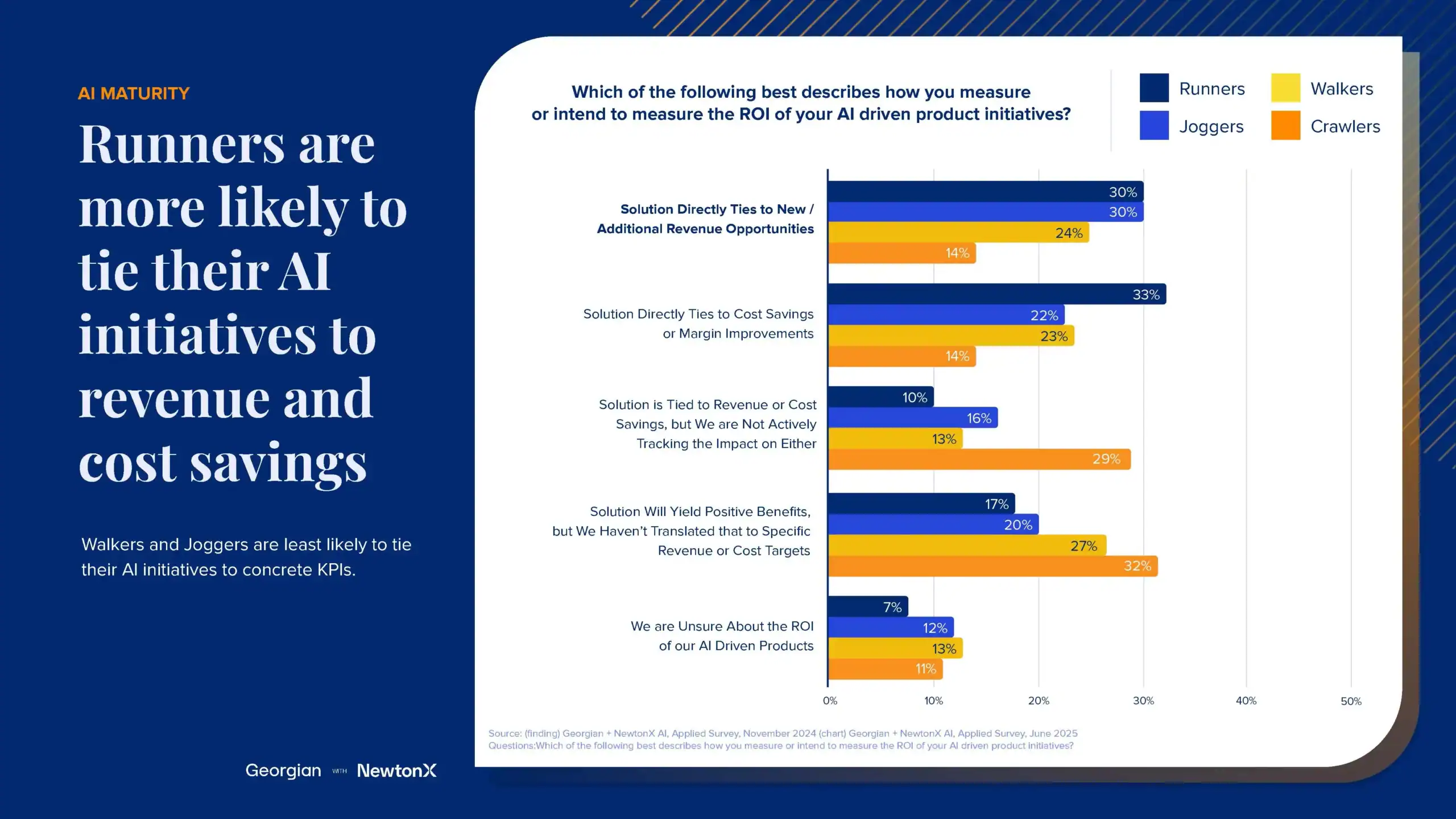
- Canadian technology companies appear to be less advanced at integrating AI/ML techniques into their operations than their global peers.
Potential Solutions
- Hinton suggests that the Government of Canada’s $2 billion AI compute spending (including $1.3 billion for computing infrastructure and $700 million for AI data centers) commitment may help reduce the AI maturity gap in Canada by providing companies with affordable, high-performance compute and a chance for Canada to develop our own AI models and solutions.
- Companies may become more AI mature by increasing the use of AI across their business and increasing the sophistication of AI use cases in production.
- While efficiency gains may be low-hanging fruit for businesses seeking to implement AI, explicitly tying AI initiatives to revenue or cost savings opportunities may help to improve AI maturity and lead to demonstrable ROI. Companies may see better success by also considering other characteristics of the Runner’s Mindset (see image above).
Gap 2: The AI Skills/Talent Gap
The Problem
A recent BetaKit article reported the following: “Shopify president Harley Finkelstein, Wealthsimple founder Mike Katchen, and Cohere founder Aidan Gomez told the crowd at Toronto’s Evergreen Brickworks to say no to leaving Canada, no to selling out, no to the idea that Canada lacks ambition.” (BetaKit)
Gomez specifically pointed to a “talent brain drain” causing Canadian talent to move to the US and break the Canadian tech ecosystem. When asked by Finkelstein how many attendees have left Canada and come back, BetaKit reported that close to half the room raised their hands.
Another dimension of this problem was identified by Cam Linke, CEO of the Alberta Machine Intelligence Institute (Amii), in an article in The Hub:
“Canada still significantly lags behind many other leading nations in the practical integration of AI across its industries. […] This sluggish AI adoption traces directly to a fundamental gap in AI literacy and workforce preparedness. Many Canadians lack a basic grasp of what AI is, how it works, its capabilities, or its ethical implications.”
Insights from Georgian and NewtonX Research
- 48% of Canadian Respondents in the Georgian x NewtonX study cited absence of technical talent as the top barrier to productization of their AI initiatives.
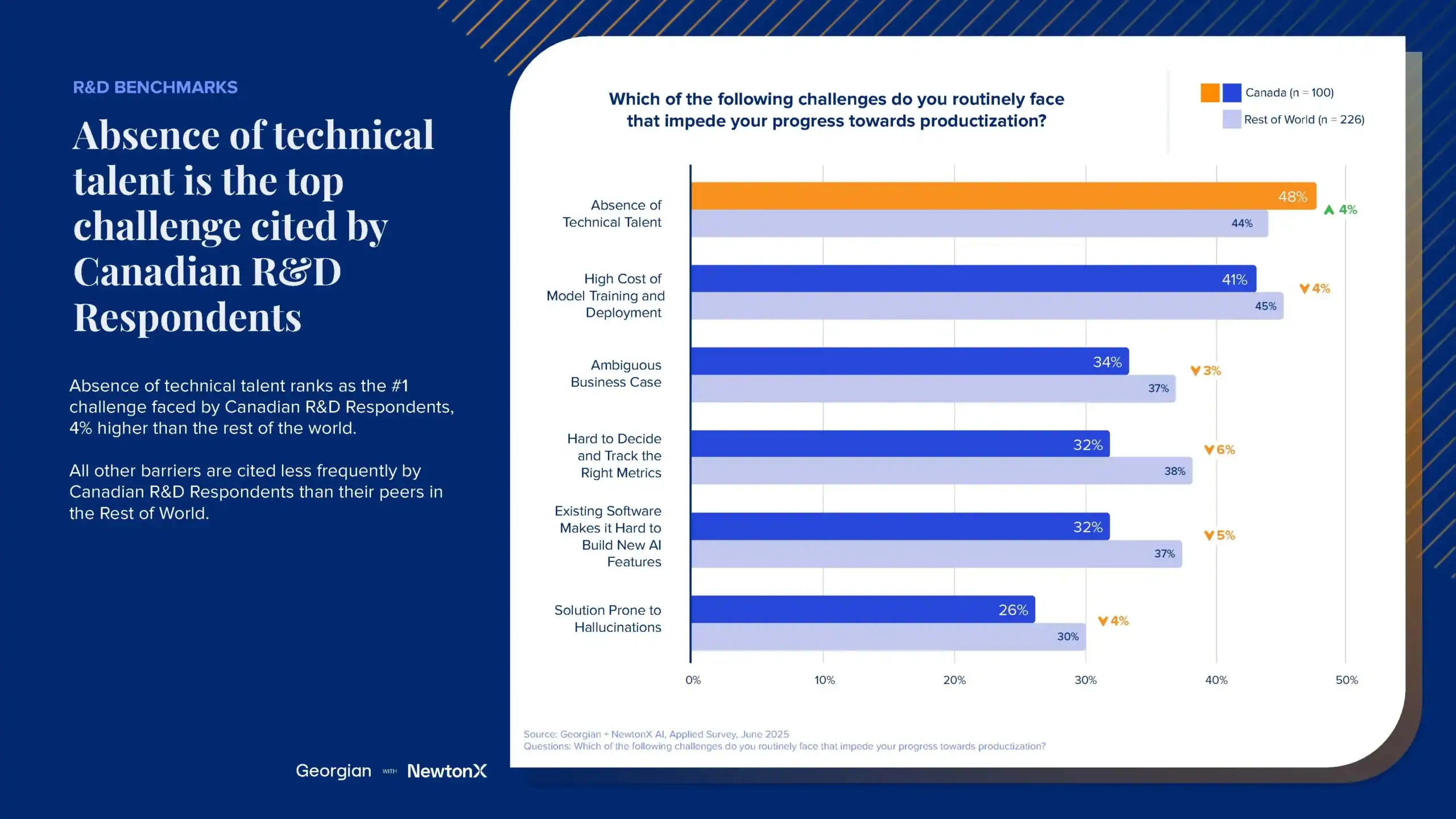
Potential Solutions
- The Vector Institute recently launched its 4th Annual AI Ontario Snapshot. According to Vector CEO & President, Glenda Crisp, “Ontario is becoming a powerful draw for AI companies and investment, providing a direct boost to our economy.” Crisp pointed to data showing that 70 new AI companies were established in Ontario and 27 AI companies relocated to Ontario in the last year. The AI Ontario Snapshot also noted that 5,605 well-paying positions in Ontario were filled by highly qualified professionals from AI-related academic programs, suggesting that the talent gap is being addressed at least at the Ontario level.
- Earlier this year, Google.org, the philanthropic arm of Google Canada awarded the Alberta Machine Intelligence Institute a $5 million grant to help post-secondary educators integrate AI materials into their courses.
- Companies can support their employees in upskilling. The University of Toronto School of Continuing Studies and University of Waterloo WatSPEED programs offer Canadians a chance to upskill through 3-4 course programs like Data Science (a program that I have just completed) and Artificial Intelligence.
- Canadian programs like Vector Institute’s FastLane Startup and Scaleup Program allow early stage Canadian companies an opportunity to learn how to commercialize using AI.
Gap 3: The AI Adoption Gap
The Problem
John Stackhouse of the Royal Bank of Canada (RBC) and Dr. Janice Stein of the Munk School of Global Affairs at the University of Toronto recently presented a RBC report at the Creative Destruction Lab Super Session 2025. The report noted that only 12% of Canadian businesses have integrated AI into their production systems, placing Canada among the lowest in the OECD for adoption.
The RBC report points to a “pervasive ‘imagination gap’—a widespread inability among Canadian businesses, especially small and medium-sized enterprises (SMEs), to see AI as relevant or beneficial to their operations.”
At a fireside chat on AI in Fintech during Toronto Tech Week, Parinaz Sobhani, Head of AI at Sagard and Shelby Austin, CEO of Arteria AI called out “the elephant in the room—that many orgs are stuck in the pilot trap, spinning in experimentation with no real path to production or value creation”.
Insights from Georgian and NewtonX Research
- While RBC found that only 12% of Canadian firms have integrated AI, the Georgian and NewtonX survey of technology companies found that Canada is on par with the rest of the world at 26% in production across R&D use cases.
- Canadian R&D Respondents do report moderately more activity on average across use cases in the pilot / testing phases than Global R&D Respondents, particularly in data analytics and automated coding use cases. Whether or not these pilots convert to production will be a benchmark to watch in the next wave of research that we expect to launch in early 2026.
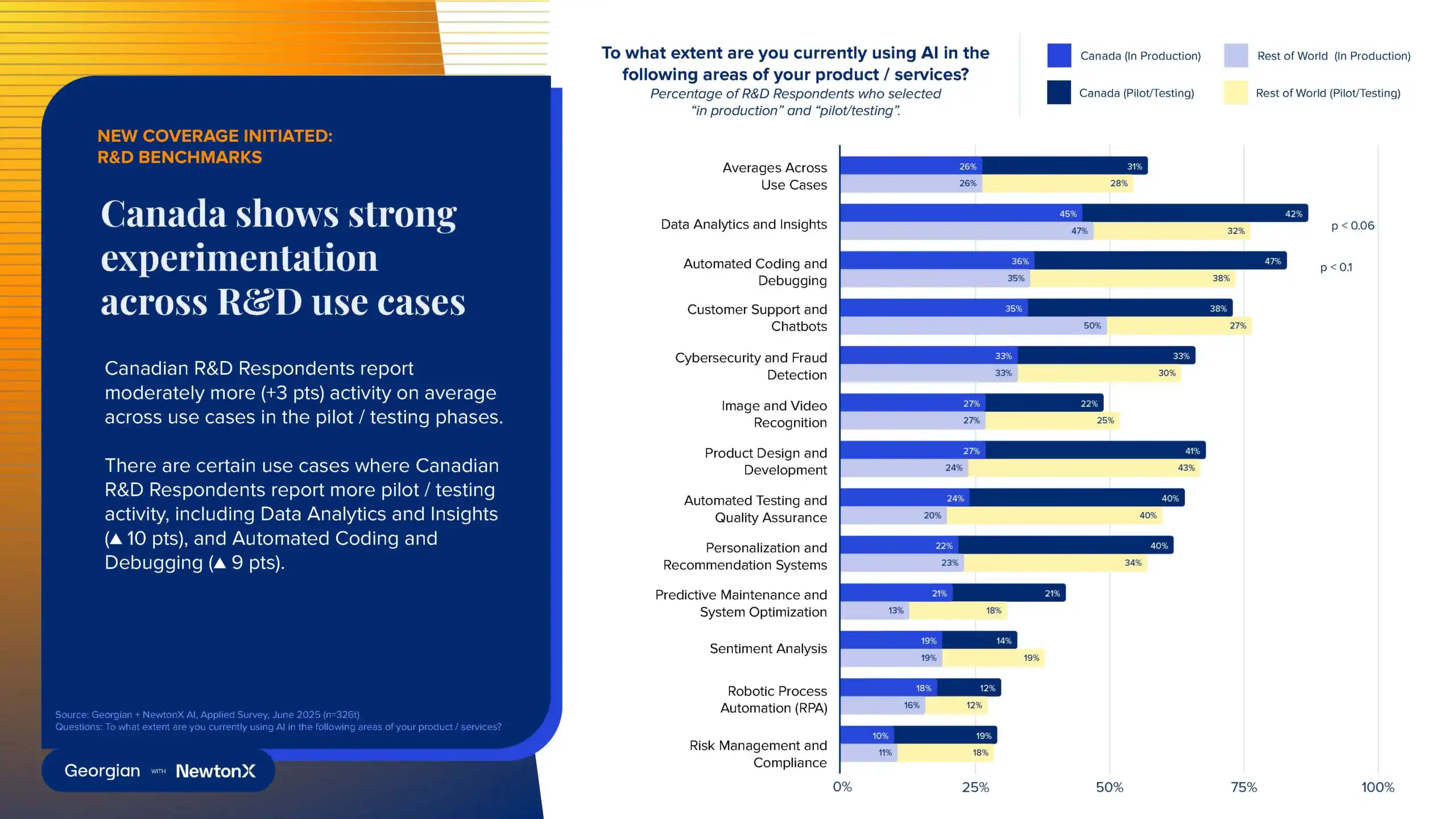
Potential Solutions
- Earlier this year, Shopify CEO Tobi Lütke told Shopify employees that AI is “a baseline expectation” and that they’ll have to demonstrate AI can’t help them before asking for more resources or staff. (BetaKit)
- Agentic tools like You.com’s Agents (disclosure: You.com is a current Georgian portfolio company) and OpenAI’s GPTs can enable employees and teams to build (and share) agents that can provide solutions for most business functions. Employees’ ability to manufacture bespoke AI solutions to business problems may consequently lead to the organic buildout and promotion of AI adoption across organizations.
Georgian will launch a report benchmarking AI adoption in Canadian technology companies on July 9, 2025 at Startupfest Montreal.
Read more like this
KumoVC: Turning Venture Data into Instant Predictions with KumoRFM
Originally published on Kumo.ai’s blog. In this technical blog post, Azin and…
Verticalized Voice AI – The Next Application Layer Shift
Every decade or so, a new interface reshapes not just how people…
A Practical Guide to Reducing Latency and Costs in Agentic AI Applications
Scaling companies that are actively integrating Large Language Models (LLMs) into their…
